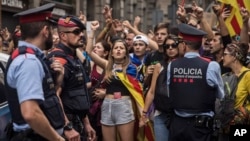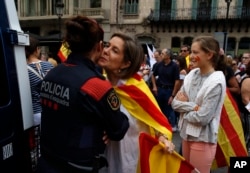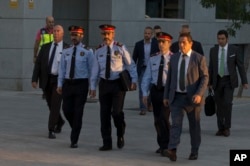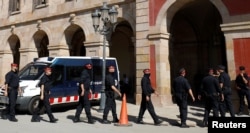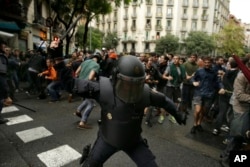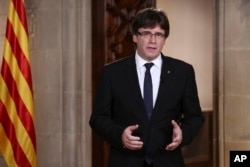On October 1, Catalonia's 17,000-member regional police force faced a dilemma: Which government should it obey?
The one in its backyard in Barcelona or the more distant central government in Madrid, which demanded the force collaborate with national police and the Guardia Civil in trying to prevent the separatists' independence referendum, which the Spanish government declared illegal?
For the Mossos d'Esquadra, the Catalan regional force, the whole experience was emotionally wrenching and the reaction of officers and their commanders was mixed.
Conflicting loyalties
And with two days to go before Madrid is likely to start imposing direct rule over Spain's rebellious northeastern region, the Mossos are once again struggling to reconcile conflicting loyalties, say officers interviewed by VOA.
On October 1, most officers chose not to intervene; others heeded Madrid's orders and, according to some accounts, shuttered three times more polling stations than the national police and Civil Guards.
In a handful of incidences, scuffles broke out between Catalan officers and their national counterparts. A Spanish police union criticized the Catalan regional police, accusing it of disloyalty, saying, "the work of the Mossos d'Esquadra … remains dominated by inaction, laxness, neutrality and the aversion to the fulfillment of their legal obligations."
Now the Mossos are once again caught between the rock of Madrid and the hard place of Catalan nationalism. Since 1980, the force has operated under the broad authority of the Catalan regional government, but came under direct operational control in 1996.
Internal debate is raging within the Mossos about what officers should do when ordered by a Madrid-appointed chief to assist in curbing the self-rule powers of their region, which could include arresting intransigent separatist leaders.
Internal debate
Most of the rank and file, and to lesser extent the top echelons, are Catalan-born. Not only will they be instructed to move against compatriots, but in some cases they will have to confront relatives, neighbors and friends in the ranks of likely protesters.
Their current chief, Josep Lluis Trapero, is under investigation by the Spanish High Court for sedition and Madrid plans to remove him formally from his post Friday when the Senate endorses the central government's decision to invoke Article 155 of the Spanish Constitution, allowing the suspension of Catalonia's semi-autonomy.
The central government of conservative Mariano Rajoy has put the Mossos on notice about what will be required. In a midweek interview, Spain's education minister, Mendez de Vigo, told The Times of London that "the government has to make sure that the law is obeyed, and if there are people on the other side who do not want to obey the law, then, through the Mossos d'Esquadra, we will have to restore the law."
Deputy Prime Minister Soraya Saenz de Santamaria has said one the first things Madrid will do this weekend is to hand political control of the Mossos to Spain's interior ministry.
The Mossos' union has said officers will follow orders issued by a Madrid-appointed police chief. But according to two rank-and-file Mossos officers — they talked with VOA on the condition of anonymity — there's turmoil inside the force and rising anxiety, with deep splits emerging as debate rages over how to navigate conflicting loyalties.
Both officers gave very similar descriptions of the turmoil in the ranks of the Mossos. They said most of the rank-and-file favor independence and are reluctant to heed Madrid. A smaller but still large group are pro-unity and say they will obey the commands of a new police chief. They argue that Spanish law takes precedence and they are obliged to apply it.
Some officers worry that if they disobey orders they will lose their jobs. Others fear if Mossos fails to follow instructions, then Madrid will deploy more national forces to reinforce the 12,000 national policemen and civil guardsmen already in Catalonia, many billeted on cruise ships docked in Barcelona harbor. That would result in a harsher climate for Catalans.
Uncertainty
"I think the reaction of Mossos will be similar to October 1," said one officer in an interview near Barcelona's Placa de Catalunya. "Unpredictable and patchy. A lot of units will continue with their ordinary day-to-day police work, but will ignore orders requiring them to move against the regional government or parliament."
A 10-year police veteran, he said the senior echelons are less divided. "Many of the top officers are not from Catalonia, so it is easier for them," he said.
Madrid is planning for some Mossos units to disobey orders and is already plotting a fresh leadership structure for the regional police to assist a new Mossos chief. Amid fears that pro-independence supporters will stage massive civil disobedience to block the imposition of direct rule, the plans include seconding agents from the national police and Civil Guard to Mossos and have them lead the units more amenable to Madrid.
But in the topsy-turvy standoff between Barcelona and Madrid following the independence vote of October 1, there are signs that Carles Puigdemont, the Catalan leader, may make a last-minute bid to derail Rajoy's direct-rule plan by announcing snap regional elections.
That would likely lead the opposition socialist party in the Madrid parliament to withhold its backing of the imposition of direct rule on Catalonia. Nonetheless, Rajoy has the necessary votes in Spain's Senate to secure approval for his hardline plan.
Meanwhile, the directors of Catalonia's public service news outlets — TV3, Catalunya Radio and the Catalan News Agency — dismissed Spanish government allegations that they favor the separatists in their coverage. At a press conference Wednesday, they pledged to "continue to work as we do now and that's non-negotiable."
Spain's deputy prime minister said earlier this week that the Madrid government's "intention with public media outlets is to return them to neutrality."
In a joint statement, the Catalan news directors said: "The threat by the Spanish government to take direct control of Catalan public media … constitutes a direct attack on the citizens of Catalonia, and a denial of their right to true, objective, pluralistic, balanced information — fundamental right in any democracy."




